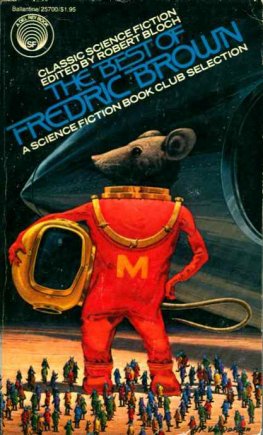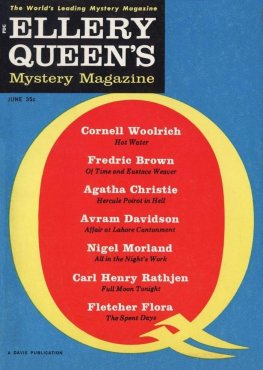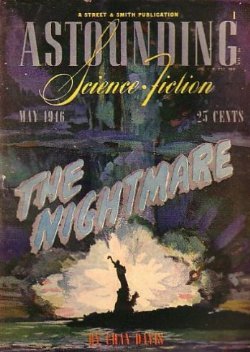Fredric Brown - Hall of Mirrors
Here you can read online Fredric Brown - Hall of Mirrors full text of the book (entire story) in english for free. Download pdf and epub, get meaning, cover and reviews about this ebook. year: 1953, publisher: Galaxy Publishing Corporation, genre: Science fiction. Description of the work, (preface) as well as reviews are available. Best literature library LitArk.com created for fans of good reading and offers a wide selection of genres:
Romance novel
Science fiction
Adventure
Detective
Science
History
Home and family
Prose
Art
Politics
Computer
Non-fiction
Religion
Business
Children
Humor
Choose a favorite category and find really read worthwhile books. Enjoy immersion in the world of imagination, feel the emotions of the characters or learn something new for yourself, make an fascinating discovery.

- Book:Hall of Mirrors
- Author:
- Publisher:Galaxy Publishing Corporation
- Genre:
- Year:1953
- Rating:4 / 5
- Favourites:Add to favourites
- Your mark:
- 80
- 1
- 2
- 3
- 4
- 5
Hall of Mirrors: summary, description and annotation
We offer to read an annotation, description, summary or preface (depends on what the author of the book "Hall of Mirrors" wrote himself). If you haven't found the necessary information about the book — write in the comments, we will try to find it.
Hall of Mirrors — read online for free the complete book (whole text) full work
Below is the text of the book, divided by pages. System saving the place of the last page read, allows you to conveniently read the book "Hall of Mirrors" online for free, without having to search again every time where you left off. Put a bookmark, and you can go to the page where you finished reading at any time.
Font size:
Interval:
Bookmark:
Hall of Mirrors
by Fredric Brown
For an instant you think it is temporary blindness, this sudden dark that comes in the middle of a bright afternoon.
It must be blindness, you think; could the sun that was tanning you have gone out instantaneously, leaving you in utter blackness?
Then the nerves of your body tell you that you are standing, whereas only a second ago you were sitting comfortably, almost reclining, in a canvas chair. In the patio of a friends house in Beverly Hills. Talking to Barbara, your fiancee. Looking at BarbaraBarbara in a swimsuither skin golden tan in the brilliant sunshine, beautiful.
You wore swimming trunks. Now you do not feel them on you; the slight pressure of the elastic waistband is no longer there against your waist. You touch your hands to your hips. You are naked. And standing.
Whatever has happened to you is more than a change to sudden darkness or to sudden blindness.
You raise your hands gropingly before you. They touch a plain smooth surface, a wall. You spread them apart and each hand reaches a corner. You pivot slowly. A second wall, then a third, then a door. You are in a closet about four feet square.
Your hand finds the knob of the door. It turns and you push the door open.
There is light now. The door has opened to a lighted room a room that you have never seen before.
It is not large, but it is pleasantly furnishedalthough the furniture is of a style that is strange to you. Modesty makes you open the door cautiously the rest of the way. But the room is empty of people.
You step into the room, turning to look behind you into the closet, which is now illuminated by light from the room. Thecloset is and is not a closet; it is the size and shape of one, but it contains nothing, not a single hook, no rod for hanging clothes, no shelf. It is an empty, blank-walled, four-by-four foot space.
You close the door to it and stand looking around the room. It is about twelve by sixteen feet. There is one door, but it is closed. There are no windows. Five pieces of furniture. Four of them you recognizemore or less. One looks like a very functional desk. One is obviously a chair a comfortable-looking one. There is a table, although its top is on several levels instead of only one. Another is a bed, or couch. Something shimmering is lying across it and you walk over and pick the shimmering something up and examine it. It is a garment.
You are naked, so you put it on. Slippers are part way under the bed (or couch) and you slide your feet into them. They fit, and they feel warm and comfortable as nothing you have ever worn on your feet has felt. Like lambs wool, but softer.
You are dressed now. You look at the doorthe only door of the room except that of the closet (closet?) from which you entered it. You walk to the door and before you try the knob, you see the small typewritten sign pasted just above it that reads:
This door has a time lock set to open in one hour. For reasons you will soon understand, it is better that you do not leave this room before then. There is a letter for you on the desk. Please read it.
It is not signed. You look at the desk and see that there is an envelope lying on it.
You do not yet go to take that envelope from the desk and read the letter that must be in it.
Why not? Because you are frightened.
You see other things about the room. The lighting has no source that you can discover. It comes from nowhere. It is not indirect lighting; the ceiling and the walls are not reflecting it al all.
They didnt have lighting like that, back where you cam from. What did you mean by back where you came from?
You close your eyes. You tell yourself: I am Norman Hastings. I am an associate professor of mathematics at the University of Southern California. I am twenty-five years old, and this is the year nineteen hundred and fifty-four.
You open your eyes and look again.
They didnt use that style of furniture in Los Angelesor anywhere else that you know ofin 1954. That thing over in the corneryou cant even guess what it is. So might your grandfather, at your age, have looked at a television set.
You look down at yourself, at the shimmering garment that you found waiting for you. With thumb and forefinger you feel its texture.
Its like nothing youve ever touched before.
I am Norman Hastings. This is nineteen hundred and fifty-four.
Suddenly you must know, and at once.
You go to the desk and pick up the envelope that lies upon it. Your name is typed on the outside. Norman Hastings.
Your hands shake a little as you open it. Do you blame them?
There are several pages, typewritten. Dear Norman, it starts. You turn quickly to the end to look for the signature. It is unsigned.
You turn back and start reading.
Do not be afraid. There is nothing to fear, but much to explain. Much that you must understand before the time lock opens that door. Much that you must accept andobey.
You have already guessed that you are in the futurein what, to you, seems to be the future. The clothes and the room must have told you that. I planned it that way so the shock would not be too sudden, so you would realize it over the course of several minutes rather than read it hereand quite probably disbelieve what you read.
The closet from which you have just stepped is, as you have by now realized, a time machine. From it you stepped into the world of 2004. The date is April 7th, just fifty years from the time you last remember.
You cannot return.
I did this to you and you may hate me for it; I do not know. That is up to you to decide, but it does not matter. What does matter, and not to you alone, is another decision which you must make. I am incapable of making it.
Who is writing this to you? I would rather not tell you just yet. By the time you have finished reading this, even though it is not signed (for I knew you would look first for a signature), I will not need to tell you who I am. You will know.
I am seventy-five years of age. I have, in this year 2004, been studying time for thirty of those years. I have completed the first time machine ever builtand thus far, its construction, even the fact that it has been constructed, is my own secret.
You have just participated in the first major experiment. It will be your responsibility to decide whether there shall ever be any more experiments with it, whether it should be given to the world, or whether it should be destroyed and never used again.
End of the first page. You look up for a moment, hesitating to turn the next page. Already you suspect what is coming.
You turn the page.
I constructed the first time machine a week ago. My calculations had told me that it would work, but not how it would work. I had expected it to send an object back in timeit works backward in time only, not forwardphysically unchanged and intact.
My first experiment showed me my error. I placed a cube of metal in the machineit was a miniature of the one you just walked out ofand set the machine to go backward ten years. I flicked the switch and opened the door, expecting to find the cube vanished. Instead I found it had crumbled to powder.
I put in another cube and sent it two years back. The second cube came back unchanged, except that it was newer, shinier.
That gave me the answer. I had been expecting the cubes to go back in time, and they had done so, but not in the sense I had expected them to. Those metal cubes had been fabricated about three years previously. I had sent the first one back years before it had existed in its fabricated form. Ten years ago it had been ore. The machine returned it to that state.
Do you see how our previous theories of time travel have been wrong? We expected to be able to step into a time machine in, say, 2004, set it for fifty years back, and then step out in the year 1954 but it does not work that way. The machine does not move in time. Only whatever is within the machine is affected, and then just with relation to itself and not to the rest of the Universe.
Font size:
Interval:
Bookmark:
Similar books «Hall of Mirrors»
Look at similar books to Hall of Mirrors. We have selected literature similar in name and meaning in the hope of providing readers with more options to find new, interesting, not yet read works.
Discussion, reviews of the book Hall of Mirrors and just readers' own opinions. Leave your comments, write what you think about the work, its meaning or the main characters. Specify what exactly you liked and what you didn't like, and why you think so.







